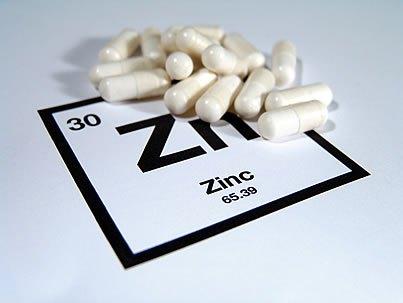
Original Article: Regeneration Performance
By Drew MacKay Timmermans
May 27, 2014
When looking for your first choice for an athletic supplement, it may help to start at the end of the alphabet with the mineral zinc. Many athletes are unaware of the natural benefits of zinc, despite research showing that zinc is found in every cell of the body. Zinc also serves a vital role every time our body’s cells divide and therefore optimal zinc levels are imperative in maximizing athletic performance. As excess blood levels of zinc can be toxic, levels should be checked regularly; if you are unsure if you should be taking zinc, contact your physician to have your levels checked. In terms of benefits for athletes, here are 6 that have direct applications for improving athletic performance.
1. Improve Strength & Increase Lean Muscle Mass
Recent research demonstrates the role zinc has in raising the levels of three important anabolic hormones in the body: testosterone, insulin-like growth factor (IGF-1), and growth hormone (GH). Several studies have found that low levels of zinc correlate with lower levels of serum testosterone, which can greatly affect many aspects of performance such as strength, body fat percentage, and recovery. Additionally, a group of researchers from Iran found that post exercise, both serum total testosterone and serum free testosterone were increased in cyclists who supplemented with zinc for 4 weeks. Further research has also demonstrated increased levels of GH & IGF-1 after exhaustive exercise. Following strenuous exercise, these increases in testosterone, GH, and IGF-1 levels result in improved recovery time, increased muscle building, and increased strength. These results have been reported in both men and women.
2. Boost Immune Function
Athletes with strong immune systems are better able to fight off sickness, but also have improved recovery times from exercise. Research by Cordova & Alvarez-Mon (1994) examined the correlation between zinc and immune function, and concluded that diminished zinc levels strongly correlated with impaired immune function. Specifically, zinc appears to play an important role in T-cell function. T-cells are crucial in mounting an immune response against both viral and bacterial infections. As strenuous exercise results in a short-term decrease in immune function, athlete’s can decrease their risk of illness by ensuring their zinc levels are optimal.
3. Support Reproductive Health
Zinc has been shown in research to be crucial in reproductive health for both men and women. Specifically, zinc plays a role in sperm maturation in men, ovulation in women, and fertility. In males prostate cells, which are important in the normal production of sperm, the necessary requirements for zinc are 10x more than other cells. Insufficient zinc levels can even contribute to an increased risk of prostate hypertrophy and cancer. In females, zinc has been demonstrated to influence the normal growth process of the egg, along with the regulation of ovulation. Research has shown that deficient zinc levels correlate strongly with decreased fertility in both men and women; these processes are all influenced by zinc as it is crucial in the binding of steroid hormones to DNA. In order to exert their effects, steroid hormones, such as testosterone and estrogen, must bind to DNA via zinc fingers.
4. Utilize Zinc as a Powerful Antioxidant
Over the years, zinc has been regarded as a powerful intracellular antioxidant as it targets and aids in the reduction of free radicals. Zinc is also particularly effective at counteracting the harmful effects of elevated iron levels. As recovery from strenuous exercise requires the clearance of free radicals, optimal zinc levels can help athletes recover more effectively from practice or competition.
5. Improve Insulin Sensitivity
Insulin sensitivity is an often overlooked aspect of optimizing athletic performance. Decreased insulin sensitivity results in decreased glucose uptake by muscle cells and increased blood glucose levels. Chronically elevated blood glucose levels can result in increased fat gain, and eventually type II diabetes. Additionally, decreased insulin sensitivity can result in submaximal glycogen storage following strenuous exercise. Zinc is crucial in assisting the proper function of insulin in 3 ways:
1. Zinc binds to insulin to allow proper storage in, and optimal release from, the pancreas in response to blood glucose levels.
2. Zinc is found in the enzymes necessary for the proper binding of insulin to muscle cells during the uptake of glucose. This is what is referred to as “insulin sensitivity”. With decreased insulin sensitivity, insulin has a decreased ability to bind to muscle cells, and therefore glucose is not taken up my muscle cells as efficiently.
3. Zinc boasts anti-inflammatory effects that help decrease inflammation inside cells, which acts to preserve cell health and assist in maintaining insulin sensitivity.
Optimizing zinc levels are an important aspect of maximizing optimal performance, and for that reason should not be overlooked. As previously stated, contact your doctor to have your baseline levels tested before starting any supplementation with zinc.
-RP
–> References
Kaya, O., Gokdemir, K., Kilic, M., & Baltaci, A. K. (2006) Zinc supplementation in rats subjected to acute swimming exercise: its effect on testosterone levels and relation with lactate. Neuroendocrinology 27(1–2):267–270
Fuse, H., Kazama, T., Ohta, S., & Fujiuchi, Y. (1999) Relationship between zinc concentrations in seminal plasma and various sperm parameters. International Journal of Urology & Nephrology. 31:401–408
Favier, A. E. (1992) The role of zinc in reproduction. Biological Trace Elements Research. 32:363
Cordova, A., & Alvarez-Mon, M. (1995) Behaviour of zinc in physical exercise: a special reference to immunity and fatigue. Neuroscience Behavioural Review. 19:439–445
Powell, S. R. (2000). The antioxidant properties of zinc. Journal of Nutrition. 130: 1447-1454


